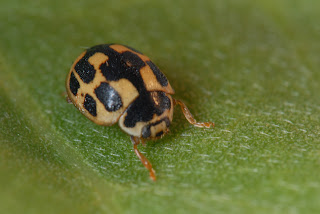Seven-spotted ladybug (Coccinella septempunctata) arrived from Europe, the immatures of this species have voracious appetite for aphids as illustrated below. The larvae moves very actively up and down the marsh elder branches grabbing aphids without a moment of hesitation. All attempts to introduce this species in North America failed, but one unintentional introduction to New Jersey succeed, and, from 1973, seven-spotted ladybug colonized every state in the US.
Another European immigrant, a small Fourteen-spotted lady beetle (Propylea quatuordecimpunctata), males have white faces and females have a black spot at the chin (pictured). This is a shyer and smaller lady bug, very inconspicuous in manners.Introduced to new York and elsewhere to control the Russian wheat aphid, but became widespread and abundant in the US.
Multicolored Asian lady beetle (Harmonia axyridis) is native to Asia and is a master of disguises with many different patterns from spotless to almost black. They like to spend the winter in house and may become a nuisance. Intentionally introduced to Louisiana in the late 1970s conquering the entire continent since.
Finally, a true native of the eastern salt marshes, Seaside lady beetle (Naemia seriata) is not found in great numbers on marsh elders, but can be very abundant on high S. patens marsh. I''ve seen numerous individuals running up and down salt marsh hay (Spartina patens) grasses. The food items of the adults of this species are not well known, and I could not see any aphids in the grass meadow. However, the larvae consume both insects (planthoppers?) and Spartina pollen, as can be clearly seen on these photos where it is feeding on Spartina patens flowers, so they are partially vegetarian.














No comments:
Post a Comment